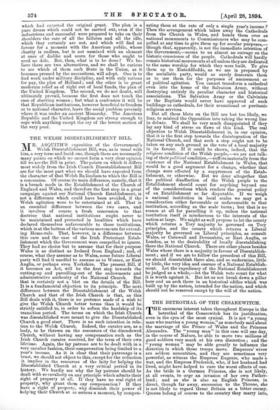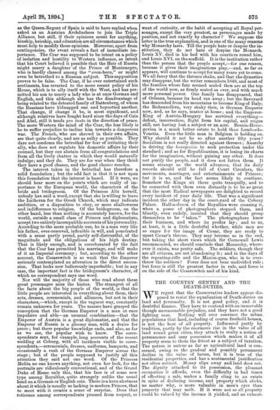THE BETROTHAL OF 'Llit CESARE WITCH. T HE enormous interest taken
throughout Europe in the betrothal of the Cesarewitch has its justification, even in the eyes of the most cynical. It is not "a young man who marries a young woman," as somebody said about the marriage of the Prince of Wales and the Princess Alexandra. The "young man" in this case will one day, in the course of Nature, be able to move two millions of good soldiers very much at his own discretion ; and the " young woman may be able greatly to influence the direction in which those troops move. Emperors' wives are seldom nonentities, and they are sometimes very powerful, as witness the Empress Eugenie, who made a war, and the Empress Frederick, who, if her husband. had lived, might have helped to cure the worst effects of one. As the bride is a German Princess, she is not likely, at all events, to urge an invasion of her own Father- land ; and as she is also an English Princess, in direct, though far away, succession to the Throne, she is not likely to regard Great Britain as a bitter enemy. Queens belong of course to the country they marry into, as the Queen-Regent of Spain is said to have replied when asked as an Austrian Archduchess to join the Triple Alliance, but still, if their opinions count for anything, kinship, heirship, and education are all circumstances which must help to modify those opinions. Moreover, apart from contingencies, the event reveals a fact of immediate im- portance. The Czar was supposed to be intent on a policy of isolation and hostility to Western influence, so intent that his Court believed it possible that the Heir of Russia might marry a daughter of the Prince of Montenegro, who is hardly classed among the "even-born," or might even be betrothed to a Russian subject. This supposition proves to be false. The Czar, if he ever entertained such sentiments, has reverted to the more recent policy of his House, which is to ally itself with the West, and has per- mitted his son to marry a lady who is at once German and English, and this although she has the disadvantage of being related to the detested family of Battenberg, of whom the Russians have kidnapped one and boycotted another. That change, if change it be, is most significant, and although relatives have fought hard since the days of Cain and Abel, still it tends pro tanto in the direction of peace. The more Western the mind of the Czar, the less likely is he to suffer prejudice to incline him towards a dangerous war. The French, who are shrewd in their own affairs, see that quite clearly, and are as sulky as possible. They dare not condemn the betrothal for fear of irritating their ally, who does not regulate his domestic affairs by their counsel, but they can abstain from all congratulations and from all the lively chatter in which they would naturally indulge; and they do. They are for war when they think they have a good chance, and the good chance recedes. The interest taken in the betrothal has therefore a solid foundation ; but the odd fact is that it is not upon this foundation that the interest is based. If it were, we should hear more on the points which are really of im- portance to the European world, the characters of the bride and bridegroom. Of the Princess Alix herself. nobody has said a word, except that she is willing to leave the Lutheran for the Greek Church, which may indicate ambition, or a disposition to obey, or mere shallowness and indifference to religion. Of the bridegroom, on the other hand, less than nothing is accurately known, for the world, outside a small class of Princes and diplomatists, accept two entirelyincompatible accounts of his personality. According to the more probable one, he is a man very like his father, over-reserved, inflexible in will, and penetrated with a sense partly proud, partly self-distrustful, of the magnitude and the obligations of his high destiny. That is likely enough, and is corroborated by the fact that the Czar has permitted his marriage, and-will make of it an Imperial ceremony ; but, according to the other account, the Cesarewitch is so weak that the Emperor seriously contemplated an alteration in the direct succes- sion. That looks now ludicrously improbable ; but in any case, the important fact is the bridegroom's character, of which no correspondent says one word.
Nor will the majority of those who read about these great personages miss the hiatus. The strangest of all the facts about the big people of the world, is that the little people are interested in everything about them, their acts, dresses, ceremonials, and alliances, but not in their characters,—which, except in the vaguest way, constantly remain unknown for years. The masses have grasped the conception that the German Emperor is a man at once impulsive and able—an unusual combination—that the Emperor of Austria is a great diplomatist, and that the Emperor of Russia is a gloomy man, with a desire for peace ; but there popular knowledge ends, and also, as far as we see, the popular wish to know. The corre- spondents sent, for example, long accounts of the recent wedding at Coburg, with all incidents visible to corre- spondents,—ceremonials, dresses, uniforms, banquets, and occasionally a rush of the German Emperor across the stage ; but of the people supposed to justify all this attention they said not one word. Of the Princess Melita no one knows anything, not even her look, for the portraits are ridiculously conventional, and of the Grand Duke of Hesse only this, that his face is of some new type among Royalties, quite strangely unlike the usual head on a German or English coin. There is a keen alertness about it which is usually so lacking in modern Princes, that to meet with it creates a sense of surprise. Does that reticence among correspondents proceed from respect, or want of curiosity, or the habit of accepting all Royal per- sonages, except the very greatest, as personages made by position, and not exactly by character ? We suppose the latter is the true explanation, and is one of the many reasons why Monarchy lasts. Till the people hate or despise the in- stitution, they do not hate or despise the Monarch. Louis XV. died in his bed with his courtiers round him, and Louis XVI. on the scaffold. It is the institution rather than the person that the people accept,--for one reason, because it gives their imaginations play,--and, so far as appears, will continue to accept for many years yet to come. We all fancy that the thrones shake, and that the dynasties may disappear, but the writer remembers 1848, and most of the families whose fate seemed sealed then are at the top of the world now, as firmly seated as ever, and with much more personal power. One family has disappeared, that of Orleans, because its head ran away ; but the Savoyard has descended from his mountains to become King of Italy; the Hohenzollern, very shaky then, is German Emperor now, and, as he says, master at home ; and the Emperor- King of Austria-Hungary has survived everything— defeat, insurrection, flight from his capital, and reigns still, not having lost a subject or an acre. Bosnia-Herze- govina is a much better estate to hold than Lombardo- Venetia. Even the little man in Belgium is holding on. Why should it not be so after another fifty years ? Socialism is not really directed against thrones ; Anarchy is driving the bourgeoisie to seek protection under the standard ; and as for Republicanism, it is losing its charm for the imagination, without gaining any other. It does not purify the people, and it does not fatten them. It seems strange as the world advances, that its daily records should still be full of Court Circulars, the movements, marriages, and entertainments of Princes ; but it is so, and the fact seems likely to continue. Somehow the Kings sit there quite tranquilly, and to be connected with them even distantly is to be so great that the most Radical newspapers are delighted to record every incident of your daily life. That was a significant incident the other day in the court-yard of the Coburg Palace. Half-a-dozen of the Royalties were crossing it, when a posse of photographers stopped them, and bluntly, even rudely, insisted that they should group themselves to be " taken." The photographers knew their business, and where its profits lay; and to us, at least, it is a little doubtful whether, while men are so eager for the image of Caesar, they are ready to upset Caesar's throne. They may become so in the end, but taking the short views which Sir Cornewall Lewis recommended, we should conclude that Monarchy, where- ever it exists, was pretty safe. The soldiers, though they are all citizens, are not abandoning it ; and in the days of the repeating-rifle and the Maxim-gun, who is to over- throw the soldiers ? Force does not bear undivided rule ; but force is still the greatest factor in rule, and force is on the side of the Cesarewitch and of his kind.



















































 Previous page
Previous page